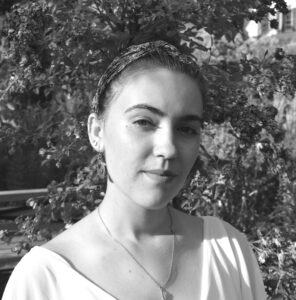A Point of Pride: Interview with Marisca Pichette


Marisca Pichette is a bisexual author, writing about all kinds of monsters. Her work has appeared in Strange Horizons, Fireside Magazine, PseudoPod, Apparition Lit, Grimdark Magazine, Uncharted Magazine, The NoSleep Podcast, Fusion Fragment, and PodCastle, among others. She lives in Western Massachusetts, collecting fragments.
What inspired you to start writing?
My main inspiration when I began writing was the beauty of language. I loved creating lush imagery, drawing on the natural world and books I was reading by long-dead white men. I didn’t realize at first how limited these stories were. As my writing developed, I began searching for the missing voices and experiences that more closely mirrored mine.
What was it about the horror genre that drew you to it?
I fell into horror by accident. For me, visceral and grotesque imagery fit seamlessly alongside the gorgeous writing I’d always admired. I didn’t intend to write horror. It just happened, slithering into my work when I went searching for myself. A lot of my horror stems from anger and defiance.
Do you make a conscious effort to include LGBTQ material in your writing and if so, what do you want to portray?
I’d say almost everything I write is queer. Sometimes the queerness is implicit, sometimes explicit. I write a lot about monsters, and I don’t think monsters will ever be simple. The connotations of exile, otherness, and mutation are very personal for all marginalized folks—not just the queer community. I like monsters because they often reveal more about the humans around them and the societal pressures at work than their relative difference. We are more alike than we wish to acknowledge.
What has writing horror taught you about the world and yourself?
Horror teaches us to push back. It teaches us not to be content with what lies on the surface, the narrative that’s projected. For me, horror also tells me that there is evil, and there’s what we’re taught to believe is evil. The knack is telling the difference.
How have you seen the horror genre change over the years? And how do you think it will continue to evolve?
Horror is evolving maybe faster than any other genre. But that evolution isn’t recognized as broadly as say, the evolution of SFF. There are huge figures in the horror genre that still claim most of the space, overshadowing newer writers who are doing incredible work to shift the focus of what’s long been a problematic genre. Indie presses are hugely important for horror’s evolution. We need to give them and their authors more recognition.
How do you feel the LGBTQ community has been represented thus far in the genre and what hopes do you have for representation in the genre going forward?
As I hinted before, horror has a problematic history of portraying marginalized folks as monsters. This isn’t unique to horror—it’s in fantasy and science fiction as well, and abounds in literary work. Queer folks have often been seen as broken, sick, or pitiable. We talk in SFF about the trope of the “evil bi.” The answer to this seems to be: make queer characters sympathetic. But we want to be the bad guys too. Like most things, the solution for me is to have more representation throughout. Have queer heroes and villains. Or just make everyone queer! That’s usually what I do.
Who are some of your favorite LGBTQ characters in horror?
The narrator in Carmen Maria Machado’s In the Dream House is someone I think about a lot when it comes to queer horror. She is intensely vulnerable, and the reader lives through the trauma alongside her in a very personal way. The fact that it is memoir makes this work even more effective. A short story that’s also stuck with me is Sam J. Miller’s “The Heat of Us,” which appeared in Uncanny Magazine.
Who are some LGBTQ horror authors you recommend our audience check out?
My first true love in the macabre was Edward Gorey, which the queer community is happy to claim as one of ours! I love the work of dave ring and Cassandra Khaw as well. I also read a lot of horror poetry. Some of the queer authors I admire in this genre are Ocean Vuong and Avra Margariti.
What is one piece of advice you would give horror authors today?
Read beyond the bestsellers. Seek out indie authors and online magazines. And go outside of fiction! Horror poetry is an amazing genre that’s growing quickly. Shine a light on those who are doing monstrous things—things no one has done before.
And to the LGBTQ writers out there who are just getting started, what advice would you give them?
Don’t be afraid to get weird. A lot of times when I write something, I can’t decide if it even is horror, because there’s no blood or monsters or death. But the genre is so much bigger than those things. Horror is tone. Horror is atmosphere. Horror is what scares you—and that can be anything at all.



